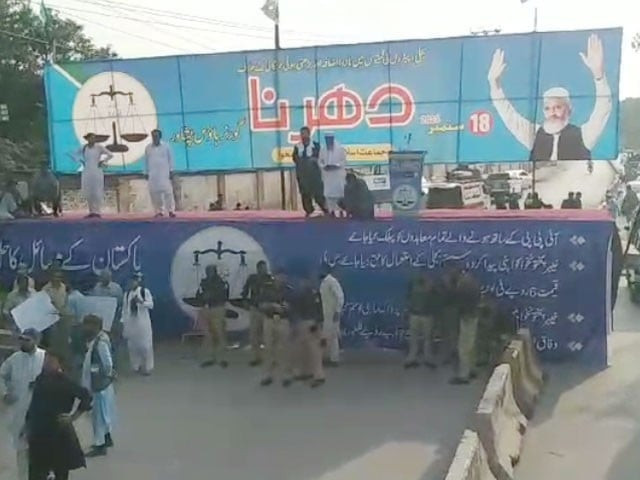JI stages sit-in outside K-P Governor House against electricity, petrol tariffs hike
Party spokesperson says protest aims to compel govt to roll back unjust rise in prices of petrol and electricity

Jamaat-e-Islami (JI) on Monday staged a sit-in outside the Khyber-Pakhtunkhwa Governor House in Peshawar against the increase in electricity and petroleum prices, as well as rising inflation, Express News reported.
The JI workers have also placed containers near a museum located near the Governor House for the party’s three-day sit-in. JI’s Amir, Sirajul Haq, has also arrived in Peshawar for the sit-in.
“Our protest movement is peaceful and not aimed at causing chaos; instead, it intends to compel the government to roll back the unjust increase in prices of helectricity and petrol,” a JI spokesperson said.
He also said that JI will also approach the Supreme Court against the excessive increases in electricity and petrol prices.
Read: JI announces sit-in against inflated power bills from 18th
It is noteworthy that JI has also announced protests in Lahore on September 21, in Quetta on September 24, and in Karachi on October 6, all in front of governor houses, to continue their anti-inflation campaign.
A day earlier, Siraj disclosed the JI's plans for the second phase of their protest movement, which will target expensive electricity and the excessive hike in fuel prices.
Addressing the Ulema Convention, he placed blame on both the Pakistan Democratic Movement (PDM) and PTI governments for the escalating prices.
He particularly criticised JUI-F chief Maulana Fazlur Rehman, the president of PDM, for not addressing the issue of inflation despite his alliance being in power.
The JI leader highlighted how inflation had stripped people of their basic necessities, including shelter, clothing, and food. He asserted that the PTI, PDM, PPP, and caretaker government were aligned in "serving" the interests of the International Monetary Fund (IMF).
He stressed that his party was essential for sustainable development in Pakistan, as the incompetence of other political parties had become evident. He urged citizens not to remain silent, emphasising that silence would equate to surrendering their rights.
Siraj expressed gratitude to the people for the successful nationwide shutter-down strike on September 2 and questioned the soaring prices of essential commodities, attributing them to the influence of the IMF on successive governments.
He asserted that regardless of which government came to power, they were all agents of the IMF, and the country needed a change in direction.
He proposed that Pakistan could generate more than 3.3 million megawatts of electricity through solar systems and harness cheaper options like hydroelectricity in K-P, wind, and atomic power to provide electricity to the people at an affordable rate.



















COMMENTS
Comments are moderated and generally will be posted if they are on-topic and not abusive.
For more information, please see our Comments FAQ